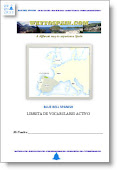Speaking Spanish is the goal but, when it comes down to foreign languages, speaking them can barely be the means to reach it. Why? Well, first, because obviously we don't speak them, so what can we say? And secondly, because besides speaking Spanish, we want to do so in the most effective way, in other words, we want to sound as good as possible, just as we would in our native language. This second feature requires education, besides exposure to the oral language, just like a well educated English speaker has more command of the language than a more poorly educated one. And what is an indisputable tool of education, that both self-educated and academically educated people have relied on? Reading.
When it comes down to learning a foreign language the way that feels most natural and comfortable to a majority of people is to read the language. First of all, it is easier to understand, mainly because it can be visualized and more easily identified, since the sounds are very foreign to us, but the letters that are used are still the same ones (when it comes down to the regular Western languages). Second, Spanish -unlike English- happens to be a very phonetic language, meaning it has simple and systematic spelling rules, so we can easily learn how to read it and start getting used to pronouncing those "foreign" sounds. Thirdly, reading gives us more time to think about what is being communicated. It also gives us time to analyze the grammar, to "visualize" how the language is working, how the words are relating to one another.
These features above are helpful at all stages of language learning, and almost exclusive in the beginning stages. As we learn more and more, by also hearing the language along with practicing the reading out loud, we are able to rely less on the written, and more on the spoken language, as we feel more comfortable understanding it. But in addition to this, the written language is the quintessential tool of education, and what happens as we advance in the speaking ability is that, if we want to continue polishing our skills and knowledge in the language, our effort in the reading and writing will always be carrying our progress in our ability to speak it.
So what is the best educational approach for our children to learn Spanish? If we want them to not only speak, but also be effective communicators, then a program that develops their reading and writing skills, as well as oral communication, is the best choice.
You do expose your children to an English reading and writing program, correct? And you do think that reading in English is a good way of expanding their education, do you not? Well, this is the original English version of the video above, which wants to make a call to the appeal of that reading bug.
Hasta luego!!



0 comments:
Post a Comment
Note: Only a member of this blog may post a comment.